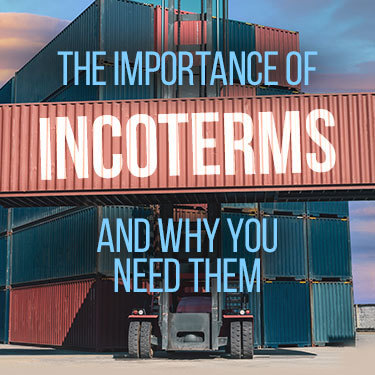
The importance of Incoterms can be seen all throughout the world of international trade. Established by the International Chamber of Commerce (ICC), Incoterms are shipping terms that all sellers and buyers should use during an international transaction.
Incoterms ® are important because they provide a standardized set of rules that all buyers and sellers must follow when engaging in international trade. This sets clear guidelines of cost, insurance and ownership for each party. Because Incoterms ® are accepted internationally, this helps facilitate trade between countries.
There are other important aspects of Incoterms that we’ll discuss in-depth further in the article.
When it comes to the global trade network, there are plenty of opportunities for things to go wrong. Due to different languages and cultural barriers, buyers (importers) and sellers (exporters) can easily misunderstand one another. This can create misunderstandings and even hostility.
The solution to these problems is Incoterms. The ICC created and published Incoterms in order to set clear-cut rules that outline how sellers and buyers should conduct themselves during the importing process. There are many important ways that Incoterms are used to facilitate smooth and easy trade.
In the realm of international trade, individuals and businesses need to protect themselves when conducting a transaction with another party. Incoterms help in this regard because it allows two parties conducting business together to define what each of their responsibilities are.
Some things that the buyer or seller might be responsible for based on the Incoterms they use include:
To show how Incoterms designate tasks to sellers, we’ll use the Customs clearance responsibility as an example. All Incoterms set rules that declare which party will be responsible for obtaining an export license and other related documents required to export goods from a country.
There is also a corresponding statement in Incoterms declare who will be responsible for an import license and other documents required to import goods into the country. Both statements will also declare who will handle the costs for these export and import documents.
All Incoterms have similar statements that declare who is responsible for each part of the import/export process. When the seller and the buyer have decided, they sign off on each responsibility.
Since there are a variety of Incoterms ® available, sellers and buyers have the ability to choose and negotiate which one would be most beneficial for each of them. However, because there are so many options available, it’s usually a good idea to work with a customs broker to give you some extra help.
Many countries participate in international trade. Each of them has its own distinct cultures and languages that can sometimes cause communication errors. Incoterms are helpful in situations like these because they’re standardized and globally accepted.
Due to the global acceptance of Incoterms, both parties will already know the options available. This will make the negotiation process a little smoother and faster.
Incoterms that require the buyer or the seller to provide insurance can help reduce risk. This is because certain Incoterms require either the seller or the buyer to cover the insurance costs from the goods being imported.
Many things can happen during the importing process that could cause damage or total loss of the goods being imported. When the seller or the buyer pays for the insurance, this reduces the risk that comes with importing the goods.
Another important but overlooked contribution of Incoterms is how they help the seller and buyer with their accounting. The very nature of Incoterms dictates who is responsible for paying for the various logistical activities involved in the importing/exporting process.
When negotiating what Incoterms to use, the seller and buyer will be able to more easily assess what they will be spending based on the Incoterms ® chosen. The buyer and seller can use that information to guide their decision on which Incoterms to settle on.
Managing a shipment is a difficult task to complete because it requires planning and executing the shipping process with high accuracy. Despite its difficulty, managing a shipment is a duty that must be fulfilled during the importing process. Different Incoterms determine who is responsible for this difficult task.
Picking Incoterms that are most beneficial to you as an importer is extremely important. Our customs clearance team can look at your situation and help you pick the best ones.

Our 45 Minute Licensed Expert Consulting Will Personally Guide You.
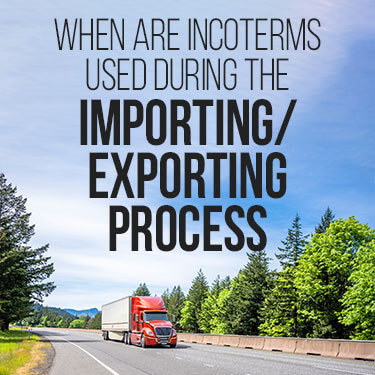
Incoterms are applied throughout all three parts of the import/export process. During the importing/exporting process, the sellers and buyers have to perform their unique duties dictated by the Incoterms that they chose for the transaction.
The pre-carriage stage is the first part of the importing/exporting process. During this process, the goods being shipped must be moved from their starting point to the location where they'll be loaded onto a transport vehicle.
Moving goods from their starting point to the airport or ocean port for loading costs money. The Incoterms that are decided on for the transaction dictate who’s responsible for paying these costs.
Once the goods arrive at the airport or ocean port, the seller and buyer have to determine who will pay to have the goods loaded. It costs money to store goods onto a plane or cargo ship for transport.
When these costs are paid and the goods are loaded, there will likely be additional surcharges throughout the duration of the journey. Incoterms determine who pays the loading costs and surcharges when they’re applied.
Most countries don’t let cargo into their borders without some sort of Customs paperwork accompanying it. Goods that don’t make customs are usually held there until proper requirements are met or when the goods are disposed of.
As with the parts of the import/export process, Incoterms dictate whether the seller or buyer will cover applicable costs that will ensure goods are cleared by Customs. This means that the party responsible for clearing the import through Customs will need to provide the proper documentation for Customs and Border Protection (CBP).
Still not sure when and how to use Incoterms? Read our article to learn more.
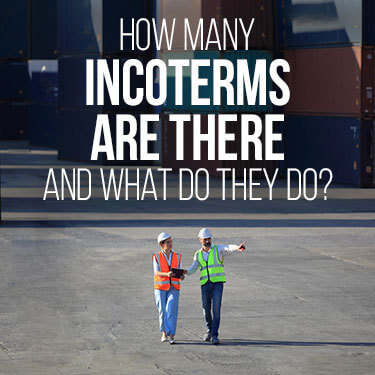
In total, there are 11 different types of Incoterms that set out guidelines for sellers and buyers to follow. Incoterms are separated into two different categories:
The first category of Incoterms is any mode of transport category. As the name implies, these terms can be used for any type of transportation for the good that the seller and buyer agree to.
There are seven Incoterms within this category which are:
The last four Incoterms can only be used for imports arriving by sea or inland waterway transport. The Incoterms for this category of transportation are:
Some Incoterms are used more often than others due to their appeal to sellers and buyers alike. The most coming used Incoterms, starting from the first one to the last one, are:
The table below shows the percentage each Incoterms makes of every U.S. import.
| Incoterms | Percentage of Imports Used |
| CIF- Cost, Insurance & Freight | 65% |
| DDP- Delivered Duty Paid | 11% |
| FOB- Free On Board | 9% |
| FCA- Free Carrier | 6% |
| FAS- Free Alongside Ship | 5% |
| Other | 4% |
To learn more about each type of Incoterm, check out our article on the 11 types of Incoterms for details about each.
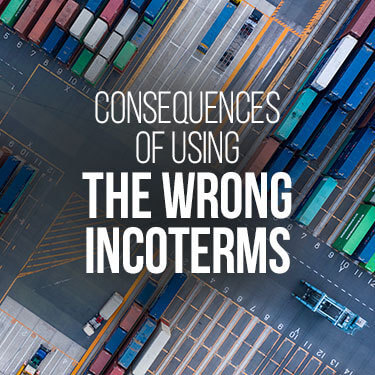
While Incoterms are useful for sellers and buyers conducting international transactions, they’re only useful if the right ones are chosen and applied. Choosing the wrong Incoterms can create many costs and risks for sellers and buyers alike.
The purpose of Incoterms is to eliminate the possibility of misunderstandings between the seller and the buyer rather than create one. Yet, if the wrong Incoterms are used, a misunderstanding is exactly what could occur.
This means that the seller and buyer will walk away from an agreement with the wrong idea of which duties each party is responsible for. Some things that could go wrong include goods not being covered by insurance, customs documents not being filled out, and additional shipping costs incurred.
Incoterms are separated by the mode of transportation that they’re used for; such as FOB being used for any type of transport shipment. Despite this distinction, certain Incoterms have fairly similar definitions that can often confuse sellers and buyers.
For example, the CIF and CIP Incoterms each apply to different modes of transportation. Each of them has fairly similar descriptions that buyers and sellers mix up. Unfortunately, confusion like this can cause unnecessary costs for both sellers and buyers during the importing process.
Keeping up to date with the most current version of Incoterms is another important part of the importing process. Incoterms change ever so slightly over the years which is why the right version of Incoterms must be used.
When sellers and buyers have agreed to use certain Incoterms, the buyer must provide the exact location the goods need to be delivered to. Incoterms like FOB need extremely specific details about the delivery locations for the goods.
If the destination is not provided or is recorded incorrectly, then the imported goods can arrive at the wrong destination, or not at all. This will cause an unnecessary delay.
It can be difficult figuring out which Incoterms work best for you. Thankfully, customs brokers can help you quickly identify which one is best for your unique importing situation.

Our 45 Minute Licensed Expert Consulting Will Personally Guide You.
As we noted, using the correct version of Incoterms is incredibly important to a successful import. The 2010 Incoterms were updated at the start of 2020 and the International Trade Organization (ITA) states that the 2010 Incoterms can still be used. The only requirement that needs to be met is that the specific version must be stated and agreed upon by both parties.
While the ICC does recommend using the 2020 Incoterms, the organization understands that this might not be a viable option for every seller and buyer. Many companies have older Incoterms involved in their complex agreements, making it difficult to redraft them with Incoterms that have been updated.
If you want to start an import-export business then read our step-by-step guide.
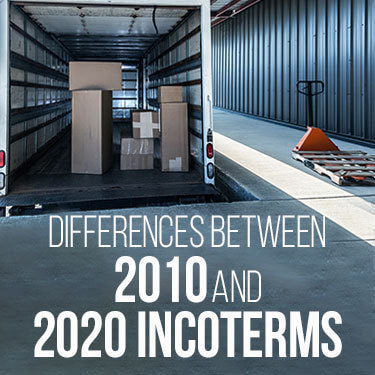
While you can still use the 2010 Incoterms, there are a few differences between them and the 2020 ones that you should know. This will help you better identify the specific one being used during the transaction and importing process.
The main changes that are applied in the 2020 Incoterms are:
Most of these changes are fairly minor, leaving the Incoterms pretty much the same as they were in 2010. Nonetheless, having the assistance of a customs broker help you navigate these differences will be helpful.
It's important to note that while Incoterms dictate the responsibilities of the buyer and seller, they do not impact the actual terms of payment. For clarification on the differences, check out our article on Incoterms vs payment terms.
In our many years of experience, we’ve encountered many importers that have no idea that Incoterms exist or the importance of using them; especially first-time importers. At USA Customs Clearance, we can show you why it’s so important to use Incoterms for any international transaction you enter into.
We can also answer any questions that you might have regarding Incoterms and consult you through the negotiation process with a seller. Our team of Licensed Customs Brokers has an extensive amount of experience that will be invaluable to you.
For answers to any other Customs clearance-related questions, reach out to our team. They will be able to answer them and help you determine your next step in the importing process.

Our 45 Minute Licensed Expert Consulting Will Personally Guide You.
 Copy URL to Clipboard
Copy URL to Clipboard

Google is changing how it surfaces content. Prioritize our high-quality guides and industry-leading coverage in search results by setting usacustomsclearance.com as a preferred source.
Add your first comment to this post